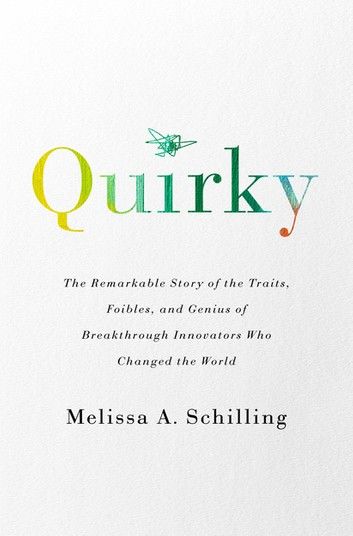| FindBook |
有 1 項符合
Quirky的圖書 |
 |
Quirky 作者:Melissa A Schilling 出版社:PublicAffairs 出版日期:2018-02-13 語言:英文 |
| 圖書館借閱 |
| 國家圖書館 | 全國圖書書目資訊網 | 國立公共資訊圖書館 | 電子書服務平台 | MetaCat 跨館整合查詢 |
| 臺北市立圖書館 | 新北市立圖書館 | 基隆市公共圖書館 | 桃園市立圖書館 | 新竹縣公共圖書館 |
| 苗栗縣立圖書館 | 臺中市立圖書館 | 彰化縣公共圖書館 | 南投縣文化局 | 雲林縣公共圖書館 |
| 嘉義縣圖書館 | 臺南市立圖書館 | 高雄市立圖書館 | 屏東縣公共圖書館 | 宜蘭縣公共圖書館 |
| 花蓮縣文化局 | 臺東縣文化處 |
|
|
The science behind the traits and quirks that drive creative geniuses to make spectacular breakthroughs
What really distinguishes the people who literally change the world--those creative geniuses who give us one breakthrough after another? What differentiates Marie Curie or Elon Musk from the merely creative, the many one-hit wonders among us?
Melissa Schilling, one of the world's leading experts on innovation, invites us into the lives of eight people--Albert Einstein, Benjamin Franklin, Elon Musk, Dean Kamen, Nikola Tesla, Marie Curie, Thomas Edison, and Steve Jobs--to identify the traits and experiences that drove them to make spectacular breakthroughs, over and over again. While all innovators possess incredible intellect, intellect alone, she shows, does not create a breakthrough innovator. It was their personal, social, and emotional quirkiness that enabled true genius to break through--not just once but again and again.
Nearly all of the innovators, for example, exhibited high levels of social detachment that enabled them to break with norms, an almost maniacal faith in their ability to overcome obstacles, and a passionate idealism that pushed them to work with intensity even in the face of criticism or failure. While these individual traits would be unlikely to work in isolation--being unconventional without having high levels of confidence, effort, and goal directedness might, for example, result in rebellious behavior that does not lead to meaningful outcomes--together they can fuel both the ability and drive to pursue what others deem impossible.
Schilling shares the science behind the convergence of traits that increases the likelihood of success. And, as Schilling also reveals, there is much to learn about nurturing breakthrough innovation in our own lives--in, for example, the way we run organizations, manage people, and even how we raise our children.
|











